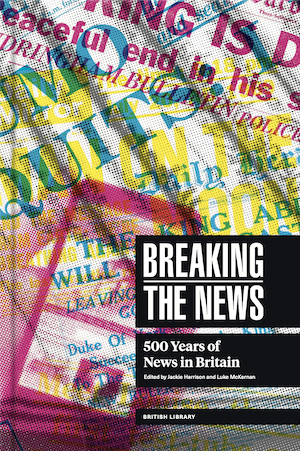Dr Jenny Taylor is a Research Fellow in Journalism, Media and Communication at the KLC. The Breaking the News cover image is used by kind permission of the British Library.

The British Library’s important Breaking the News exhibition draws to a close this autumn. A good time then to ponder, with Paul Glader, in this The Big Picture’s journalism edition, the bleak story of a changing – many would say failing – news industry in the US: It’s the same story in the UK where sales of local papers fell by roughly half between 2007 and 2017, with 6,000 newsroom jobs lost in twelve years. Pretty much everywhere in the Western world digital media are colonising the traditional income streams of the so-called “legacy press,” particularly the locals, either putting it financially out of business,(1) or rendering it irrelevant as readers go online. And where the press itself manages to adapt to the online world, reader experience becomes disembodied and disengaged. Anxieties surround the digital revolution much as they did when print supplanted scribal culture in the sixteenth century, and triggered thirty years of war.
Digital overload and trivialisation are certainly destroying our “palate” for news, especially local news. Now we can live everywhere at once, nowhere matters particularly. All boundaries blur, particularly the line between news and infotainment. Local news has traditionally fed and fed from, a sense of place. But our identities are no longer reinforced by local knowledge or local accountabilities. A recent Ofcom survey in the UK showed that 18–24-year-olds get their “news” from Instagram, or TikTok, or from their families.(2) At the same time as horizons have narrowed almost to vanishing point, they have paradoxically also gone global. “The sheer scale of these platforms – Instagram now has more than a billion users – means that there is a small country’s worth of accounts for every personal interest,” says the UK Independent.(3)
But you won’t, as you might expect, find stories about bin collections or court cases. And this matters. Glader quotes Paul Starr in a 2009 essay, that journalism is “our eyes on the state.” Jackie Harrison, Professor of Public Communication at Sheffield University, UK, edited the British Library’s Breaking the News exhibition catalogue, in which she writes of “the civil ideal of news.” It is significant “because it provides the civil sphere with a powerful symbol of itself – a symbol based upon two critical and related elements (a) trustworthiness and (b) liberal ideals,”(4) she writes. Dame Frances Cairncross in her 2019 Review, A Sustainable Future for Journalism, lamented the “democratic deficit” caused by the loss of court and council reportage. Indeed, Facebook has taken over much of the funding for local reporter training in the UK, the US and around the world.(5)
Underlying the problem of press attrition are huge questions of truth and trustworthiness and four eminent journalist academics look at the problem for us from different perspectives. If truth is “what’s true for you” – or “your truth” in Oprah Winfrey’s immortal words – we have lost the big story by which little local stories are selected and told. It is impossible to say what matters or should matter, so how do editors operate? Instead, we get either a scatter-gun approach – too much at once – or else a stupefying “moral mania,” with one story flogged to death for weeks on end. Robin Aitken, a broadcaster who worked for many years for the BBC’s current affairs flagship programme Today, until he was scandalously pensioned off for raising difficult questions about editorial bias, describes the loss of alternative narratives at the UK’s public service broadcaster. (6) Marvin Olasky in Washington points up the challenge for Christian reporters of maintaining a “biblical objectivity,” especially about scandals involving fellow evangelicals. And senior ethicist Dr Anna Abram, Principal of the Margaret Beaufort Institute of Theology in Cambridge, provides some clues as to how Christian journalists might “do truth” in the post-truth era. We hope you will be stimulated to value your news producers more, and pray into the growing gap.
The Kirby Laing Centre for Public Theology in Cambridge. Charity registered in England and Wales. Charity Number: 1191741
Kirby Laing Centre, The New Mill House, Unit 1, Chesterton Mill, French’s Road, Cambridge, CB4 3NP
© 2022 The Kirby Laing Centre for Public Theology in Cambridge